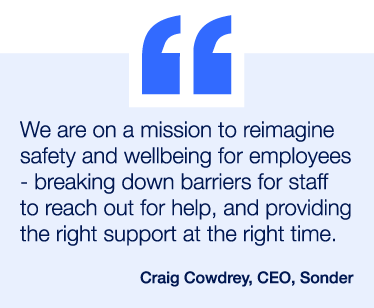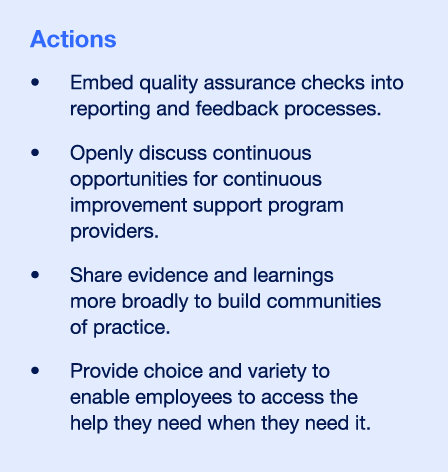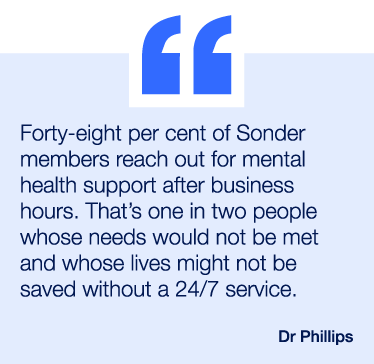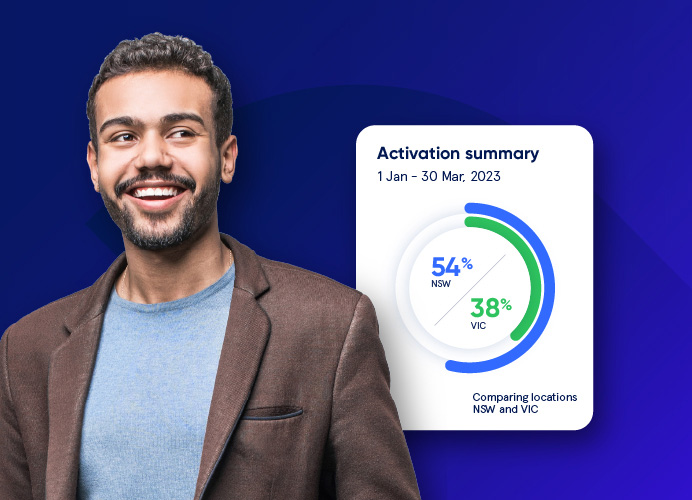Workplace mental health: employee experiences

Insights.
Everywhere we turn, we’re reading statistics about employees wanting their employers to provide better workplace mental health support. Millennials in particular want their employers to implement additional mental health initiatives – 87 per cent compared to 67 per cent of baby boomers. But, there’s a disconnect; few employees are using the support already offered – and some of us are starting to examine why.
We offered our findings in a joint Sonder-PwC Australia report, Rethinking workplace mental health and wellbeing, which identified three reasons for the disappointing uptake of workplace mental health support:
- It’s not built into the culture;
- Solutions are not the right fit; and
- Poor past experiences.
The Wall Street Journal exposé, “Why won’t employees use their companies’ mental health benefits”, added more weight to the discussion. And in the Harvard Business Review, Gartner shared their survey data and offered their suggestions for “How to get employees to (actually) participate in well-being programs”.
This post shares an excerpt of the third reason – “poor past experiences” – from our joint report.

Excerpt from our Sonder-PwC Australia report
This report explores three reasons for the low uptake of workplace mental health support.
Reason three: poor past experiences
Sixty-nine per cent of employees would turn down a promotion in favour of their mental health and wellbeing, according to a recent survey conducted by PwC and Atlassian.
In a different survey, 50 per cent of Millennials and 75 per cent of Gen Zers had left roles in the past for mental health reasons, either voluntarily or involuntarily.
Yet, poor past experiences are deterring employees from future use of workplace support programs. This is often due to concerns around quality, and delays in care.
Quality concerns
There are limited independent studies in Australia that assess EAP effectiveness and return on investment (ROI). This is likely due to strict confidentiality requirements, a lack of sophisticated data insights, and an absence of alternative offerings for comparison.
Anecdotally, HR managers and functional leads report mixed results from their EAPs. Some employees say they benefitted. Some say they did not.
The Productivity Commission Inquiry Report 2020 recommended that minimum standards be developed for EAPs, and for the evaluation of these programs.
The report also recommended that employers work with Safe Work Australia to share evidence about employer- initiated mental health interventions, to “help all employers choose the most appropriate intervention for their workplace”.
Privacy
It is important for employees to preserve their anonymity when seeking information about mental health support through the workplace. People want to know they cannot be identified, treated differently or disadvantaged in any way. Guided steps towards information should include transparent information about privacy and confidentiality, to build trust in the experience.
Program feedback is important to help improve the appropriateness and accessibility of support and services, but information must always be visible about what and why data is collected. Quality assurance processes are key to ensuring that the appropriate mechanisms are in place to protect data and use it responsibly.
Delays in care
A number of factors impede access to mental health care in Australia. These include: disproportionate distribution of health professionals by geography; complexity of needs; system and service fragmentation; out of pocket costs; and long wait lists. The pandemic has placed extra pressure on demand, with anecdotal reports of growing wait lists as long as nine months.
When employees need help, they need it now. Not tomorrow and not in three weeks. Poor past experiences (e.g. waiting on hold for more than an hour, needing to call back tomorrow, or joining a wait queue for in-person care) result in delays to care and discourage future use.

Want to learn more?
To read the full Sonder-PwC Australia report, please click here. For more information about how Sonder can help you rethink your workplace support, we invite you to contact us here.
About Sonder
Sonder is an Active Care technology company that helps organisations improve the wellbeing of their people so they perform at their best. Our mobile app provides immediate, 24/7 support from a team of safety, medical, and mental health professionals - plus onsite help for time-sensitive scenarios. Accredited by the Australian Council on Healthcare Standards (ACHS), our platform gives leaders the insights they need to act on tomorrow's wellbeing challenges today.
Related posts
There's so much more to share
Sonder is reimagining health, safety and wellbeing support. Sonder proves human centric care leads to earlier intervention. Sonder impacts one person at a time to drive meaningful change across an organisation. Sonder understands people and how to support them.







